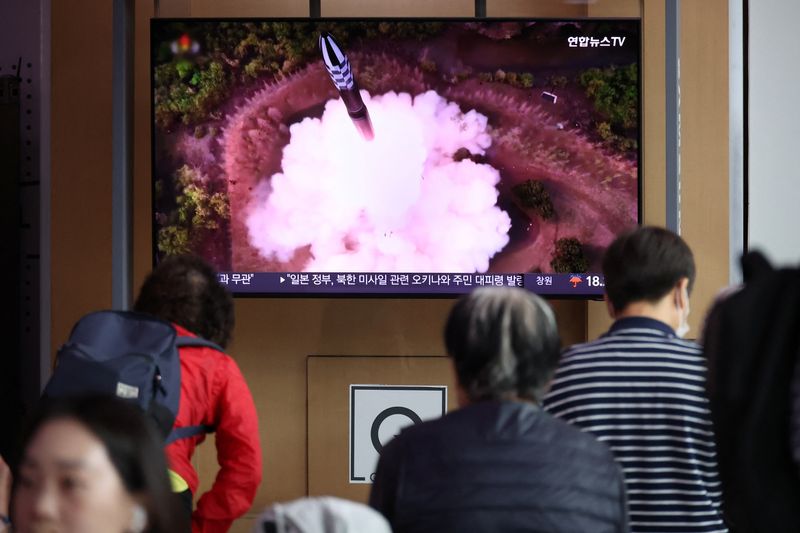By Ju-min Park and Daewoung Kim
SEOUL (Reuters) -Air raid sirens and a mobile phone alert calling for evacuations rattled residents of South Korea's capital, Seoul, early on Wednesday after North Korea tried to launch what it said was a satellite.
Nuclear-armed North Korea's sixth satellite launch ended in failure, with the booster and payload plunging into the sea, but it still prompted emergency alerts and evacuation warnings in parts of South Korea and Japan.
"I was so panicked. Nine-one-one lines were busy and the internet was slow," said Lee Juyeon, 33, a resident of the densely populated city of about 10 million.
"So without knowing what was really happening, I was about to head down to a basement wearing a wrap carrier with my baby," she added.
Sirens started to wail in Seoul at 6:32 a.m. (2132 GMT Tuesday) as the city issued a "Presidential Alert" telling citizens to prepare for a potential evacuation.
About 10 minutes later, however, the Interior Ministry sent out another mobile message to say the city's alert had been issued in error.
Lee eventually decided to stay put in her home despite seeing a television headline saying the alerts related to the launch of a North Korean space vehicle, but she showed photographs of friends packing bags, readying to leave.
The two countries are still technically at war seven decades after the Korean War ended in an armistice, and residents of Seoul have grown accustomed to living in the shadow of threats from their neighbour.
Some office workers in Seoul's central district, who received the city's alert during their morning commute, said they had wondered how to respond to it - with some planning to withdraw cash or buy bottled water.
South Korea has bomb shelters throughout the country, but they are not specifically built to protect against nuclear, chemical or biological attacks.
They are mostly in subway stations or basements and parking garages in private apartments and large commercial buildings, designated as shelters with the owners' consent.
Later on Wednesday, Seoul Mayor Oh Se-hoon apologised for confusion over the city's alert but defended the decision to send one as a precaution for public safety. He said the city would improve the wording of future warnings.
"Alerts" and "evacuation" were the most trending topics on Twitter in South Korea early on Wednesday, with confused social media users scrambling to grasp what was going on or to find evacuation areas.
"Hey guys, given Twitter is still working, I guess it is not a war," said one user using the handle @Kimisnim__.
